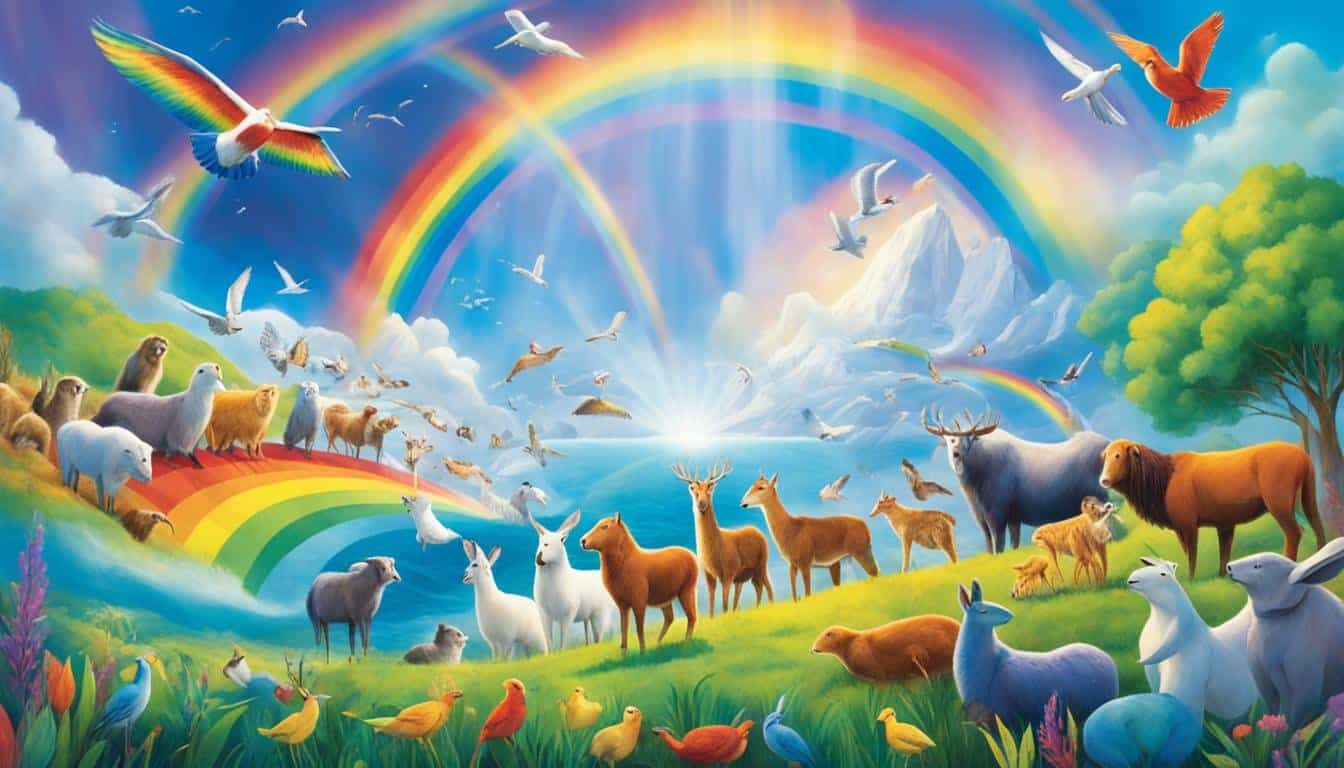Have you ever noticed the beautiful songs in Genesis?
Genesis, the first book of the Bible, is known for telling stories. These tales include how the world began, the first sin, and the adventures of Abraham, Isaac, and Jacob. But hidden in these stories are poems and songs.
These poetic hymns and songs bring a special view. They connect spirituality with creativity. They are full of beauty and meaning.
Excited to learn more about these songs? They are full of wonder and wisdom. They make us think about life and faith in a new way.
Key Takeaways:
- Genesis has eight beautiful hymns and songs that connect spirituality with creativity.
- These verses bring extra beauty to Genesis’ stories.
- They make us think about the big questions in life and faith.
- Exploring these poems helps us see how spirituality and art are deeply linked.
- They show how powerful poetry is across time to move us.
The Song of Creation (Genesis 1:1-31)
Genesis starts with a grand “Song of Creation.” It’s a poem that explains how the world came to be with God’s words. This song highlights how God made the universe through divine speech.
The Genesis creation song starts with “In the beginning, God created the heavens and the earth.” Over six days, we see the world take shape. God creates light, separates it from darkness, makes the skies, seas, plants, and then the sun, moon, and stars.
God finished creating in six days and rested on the seventh. He made this day special, calling it the Sabbath. This shows how important rest is for everyone.
“And God said, ‘Let there be light,’ and there was light.”
In Genesis, the Song of Creation celebrates the amazing world we live in. It shows us our place in God’s creation. We are to respect and care for the earth.
The Structure of the Song of Creation
The Song of Creation is divided into seven parts, one for each day of God’s work. This division helps us see the order and purpose in God’s creation.
- Day 1: The Separation of Light and Darkness
- Day 2: The Formation of the Firmament (Sky)
- Day 3: The Emergence of Dry Land and Vegetation
- Day 4: The Creation of Sun, Moon, and Stars
- Day 5: The Abundance of Marine and Avian Life
- Day 6: The Creation of Land Animals and Human Beings
- Day 7: God’s Rest and Sanctification of the Sabbath
The Song of Creation’s structure shows us God’s order and care. Each day adds something new to the world. This way, we see a perfect harmony in creation.
Table: Summary of the Song of Creation (Genesis 1:1-31)
| Day | Creation |
|---|---|
| 1 | Separation of Light and Darkness |
| 2 | Formation of the Firmament (Sky) |
| 3 | Emergence of Dry Land and Vegetation |
| 4 | Creation of Sun, Moon, and Stars |
| 5 | Abundance of Marine and Avian Life |
| 6 | Creation of Land Animals and Human Beings |
| 7 | God’s Rest and Sanctification of the Sabbath |
The Genesis creation song is powerful. It shares the wonder of the world’s beginning. This poem draws us closer to understanding God’s creative power. Let’s be amazed and thankful for the beautiful world God has made.
The Song of the Garden (Genesis 2:8-15)
Genesis gives us the “Song of the Garden,” a beautiful piece about the Garden of Eden’s beauty. It portrays a lush paradise filled with life. Each tree is lovely and offers food.
The Euphrates River flows through Eden, bringing fertility and abundance. The “Song of the Garden” shows us how nature and humanity lived in perfect harmony. Adam and Eve enjoyed a perfect relationship with their environment.
God put Adam in Eden’s lush Garden to take care of it. This Garden showed the close connection between people and the divine. It was a sacred place, showing the balance and need of all parts of creation.
“And the LORD God took the man and put him in the Garden of Eden to tend and keep it.” – Genesis 2:15
The image above captures the grand Garden of Eden. It shows the lush greenery and peace present in the Garden.
The Song of the Garden in Genesis offers us a look into a world full of beauty and respect. It highlights the deep connection between people and the natural world, seen as a divine present.
The Song of Lament for Abel (Genesis 4:10-11)
The Song of Lament for Abel from Genesis is unique. It captures deep sadness and questions after Abel’s murder. This is the first death recorded in human history.
“What have you done? The voice of your brother’s blood is crying to me from the ground.”
This lament is full of sorrow and pain when innocent lives end. It shows the severe impact of violence, spreading grief through families and communities. The Song of Lament for Abel reminds us to value and protect each other.
For ages, this song has touched hearts, reminding us life is fragile. It calls for justice and kindness. Everyone longs for peace and hopes violence will one day disappear forever.
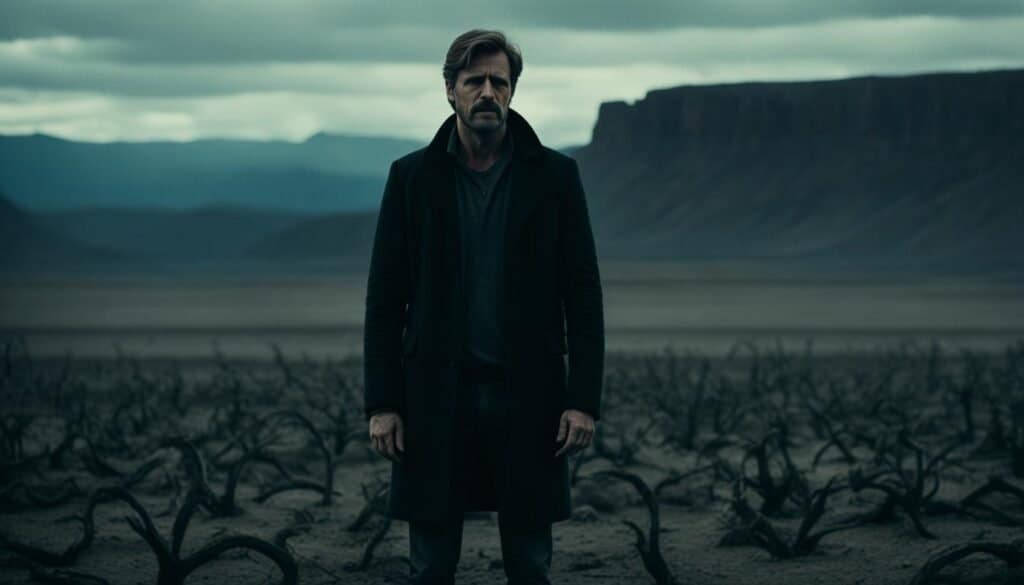
The Song of Lamech (Genesis 4:23-24)
In the book of Genesis, we find The Song of Lamech. This poem, by Lamech, looks into a world full of violence and first steps towards societies.
We will take a close look at the deep verses of this old song and find its true meanings.
Adah and Zillah, listen to my voice;
wives of Lamech, hear my words:
I have killed a man for wounding me,
a young man for striking me.
If Cain’s revenge is sevenfold,
then Lamech’s is seventy-sevenfold.
Lamech’s words travel through time, showing a world dealing with violence’s effects. Although we don’t know the full story, these words give us a peek into early societal rules. They show us justice was moving from personal to more structured ways.
The Song of Lamech points to a time when justice became less about single grudges and more about community rules and fairness in punishment.
The Table of Comparative Retribution
| Cain’s Revenge | Lamech’s Revenge |
|---|---|
| Sevenfold | Seventy-sevenfold |
This table shows a big increase in reactions and how solutions to fights were getting more complicated. Lamech’s talk shows how the idea of revenge was changing, away from just personal reasons.
The Song of Lamech is a powerful look at ancient society and its changes over time. By studying these old verses, we learn about the early stages of human culture, challenges, and community growth.
The Blessing of Noah (Genesis 9:25-27)
Let’s look into the “Blessing of Noah.” He shared wise, forward-looking words with his sons. This moment in Genesis is important as it not only talks about Noah’s sons’ futures but also predicts future conflicts and friendships. These will have a big effect on the world.
“Cursed be Canaan! The lowest of slaves will he be to his brothers. Blessed be the LORD, the God of Shem! May Canaan be the slave of Shem. May God extend Japheth’s territory; may Japheth live in the tents of Shem, and may Canaan be the slave of Japheth.”
Noah’s words show a mix of divine favor and human actions. His announcement darkly shadows Canaan’s future to being a slave. Shem gets a blessing showing he will be a favored line. This hints at the chosen people who will come later. For Japheth, it speaks of more land and living closely with Shem. This shows nations will have deep connections and can unite despite their differences.
The Significance of Noah’s Blessing
Noah’s blessing has deep meaning that echoes in the bible’s history. It signals the world after the flood, leading up to the journey of the Israelites. The impact of Noah’s prophecy goes beyond his family, shaping the paths of many nations. It also offers a peek into God’s plan for redemption.
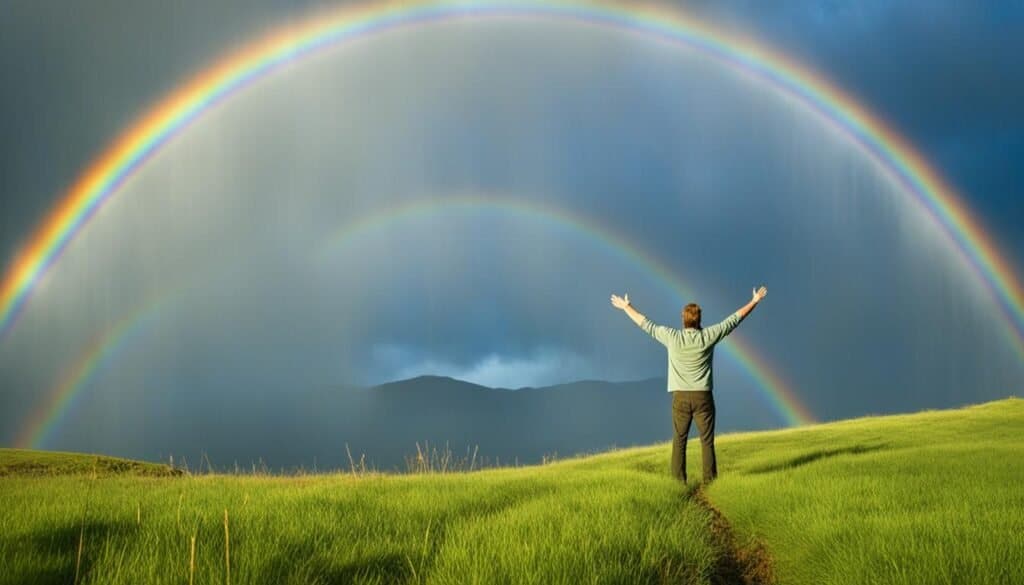
Noah’s blessing works like a guide for civilization’s future. It points out the close link between humans and God. It remembers us that our choices matter a lot, joining our fates with others. As we consider the Blessing of Noah, let’s think about the power of words, family heritage, and how our choices interact with God’s will.
| Blessing Recipient | Blessing Received |
|---|---|
| Canaan | Curse, servitude to his brothers |
| Shem | God’s favor, chosen lineage |
| Japheth | Expanded territory, shared dwelling with Shem |
The Song of the Well (Genesis 21:17-19)
In Genesis, we find the Song of the Well (Genesis 21:17-19). It’s a beautiful story that’s both uplifting and poetic. It tells of a desert oasis, a source of hope, survival, and divine help. This account marks a big change in the lives of Hagar and Ishmael thanks to finding a spring in the wilderness.
“And God heard the voice of the boy, and the angel of God called to Hagar from heaven and said to her, ‘What troubles you, Hagar? Fear not, for God has heard the voice of the boy where he is. Up! Lift up the boy, and hold him fast with your hand, for I will make him into a great nation.’ Then God opened her eyes, and she saw a well of water. And she went and filled the skin with water and gave the boy a drink.”
Lost in the desert without Abraham, Hagar is at rock bottom when her water runs out. But just then, an angel appears after hearing Ishmael’s cries. Guided by God, Hagar finds a well that saves their lives. The Song of the Well shows how God’s help turns life around, offering hope and a future to both mother and son.
This poem isn’t just about physical rescue. It’s also about emotional and spiritual healing for Hagar and Ishmael. The Song of the Well teaches us about God’s mercy and care. It shows the value of finding peace and joy even in the hardest moments.
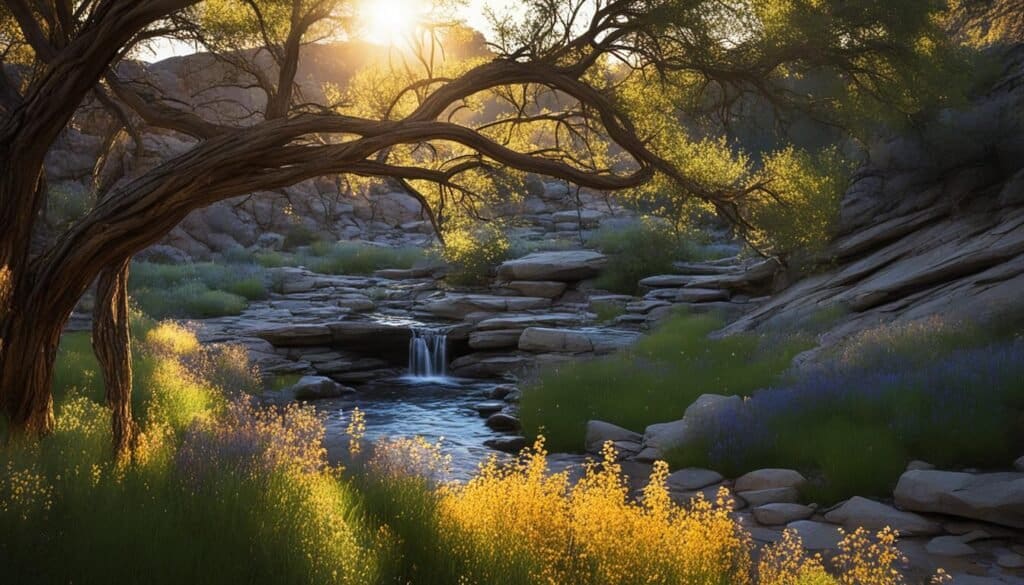
| Themes | Meaning |
|---|---|
| Divine Intervention | The Story of the Well shows God helping those who believe, offering guidance and food in their time of need. |
| Hope and Restoration | Finding the well brings hope and faith back for Hagar and Ishmael. It proves that God can turn little into much. |
| Recognition and Gratitude | Hagar thanks God for saving them, highlighting the need to see and appreciate divine gifts. |
The Song of the Well is a powerful lesson in trust and hope. It tells how God’s acts can change everything, even the toughest times. This story shows that in desolation, God’s love brings new life.
The Blessing of Isaac (Genesis 27:27-29)
In Genesis, we find the Blessing of Isaac given to his son Jacob. Though deception plays a part, this blessing shows how deep a connection blessings share with the covenant over time.
The Blessing of Isaac in Genesis means a lot. It shows a big move of divine blessings to the chosen line, even with deceiving tactics. Isaac planned to give this blessing to Esau but Jacob and Rebecca tricked to get it for Jacob.
“And he came near and kissed him. And Isaac smelled the smell of his garments and blessed him and said, ‘See, the smell of my son is as the smell of a field that the Lord has blessed! May God give you of the dew of heaven and of the fatness of the earth and plenty of grain and wine. Let peoples serve you, and nations bow down to you. Be lord over your brothers, and may your mother’s sons bow down to you. Cursed be everyone who curses you, and blessed be everyone who blesses you!'”
The blessing Isaac gave Jacob showed lasting plenty and power in the poetic sense. It talks about smelling fields blessed by God. This means Jacob will have lots of success and power over his brothers. It’s a promise of a long line of blessings and protection.
Even though it wasn’t straight, what Jacob got from Isaac’s blessing is very important in Genesis. It previews the hard times Jacob and his family will go through. But it also promises they will get through and succeed because of God’s support.
The Blessing of Isaac shows how God’s promises continue through time. It tells us blessings from family are really powerful and shape our future and our family’s future. So, blessings really matter in our lives and in our family lines.
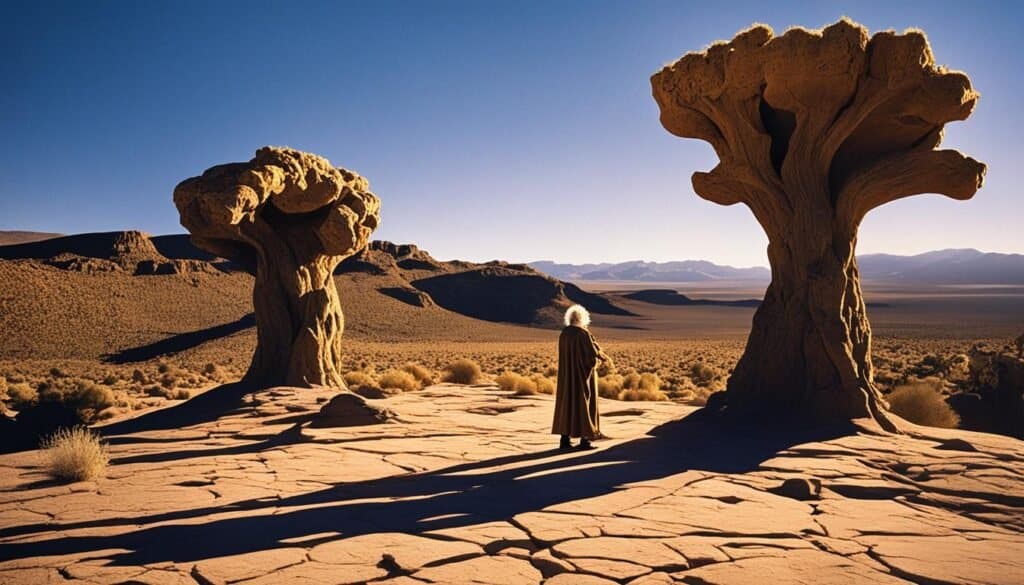
Next, we’ll look at another important part in Genesis’s poetry. We’ll study the mysterious Song of Jacob, where Jacob talks about his sons’ future and the twelve tribes’ futures. Stay with us and learn more.
How Does Hannah’s Story Reflect the Themes in Poetic Hymns and Songs Recorded in Genesis?
Hannah’s journey of faith and prayer embodies the profound themes found in poetic hymns and songs recorded in Genesis. Her heartfelt petitions reveal deep longing and devotion, mirroring the poetic expressions of trust and reliance on God. Through her story, the essence of worship and praise resonates powerfully, connecting past and present.
The Song of Jacob (Genesis 49:1-28)
In the last part of Genesis, we explore the deep “Song of Jacob.” Jacob, or Israel, speaks blessings and future predictions to his sons. He tells them what their tribes will achieve.
This poem highlights the traits and struggles of each tribe. Jacob uses vivid words and stories to show their strengths and importance. He talks about their role in building Israel.
The Song of Jacob gives deep insight into ancient family life. It also hints at future Bible stories. Through this song, we see the hopes and stories of the Israelite people.
This song is both beautiful and full of wisdom. It shows us the value of poetry in keeping cultures alive. It encourages us to think about our own family stories and the lessons they hold.
Affiliate Disclosure: "As an Amazon Associate I earn from qualifying purchases made from links in this post. We are a participant in the Amazon Services LLC Associates Program, an affiliate advertising program designed to provide a means for us to earn fees by linking to Amazon.com."

